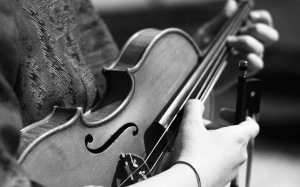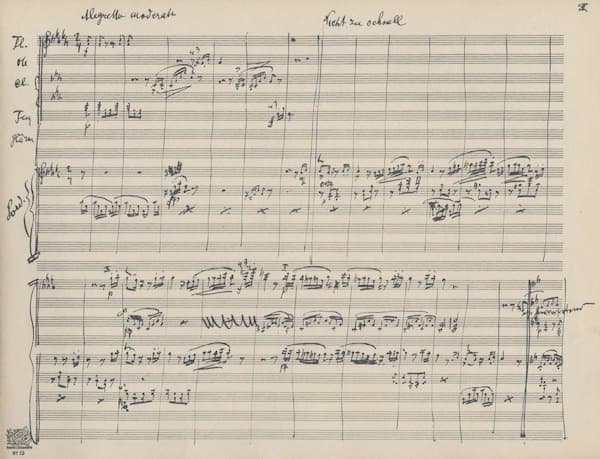 We all know that the world can be a dark and lonely place. But remember: as a musician, you have the power to shine light into dark corners.
We all know that the world can be a dark and lonely place. But remember: as a musician, you have the power to shine light into dark corners.
I belong to an adult amateur string orchestra, and every holiday season we get together and play our instruments at local nursing homes and assisted living facilities. Every time we play, I’m amazed at how healing the music is to our listeners – and to us musicians, too.
Here are a few tips to help you get the most out of your experience:
1) Find a mix of players with a variety of experience levels and strengths.
2) Delegate responsibilities. Maybe one person takes on scheduling, while another provides rehearsal space, and another procures sheet music. If one person is in charge of everything, the responsibility might be daunting. But if everyone pitches in, these performances are relatively easy to arrange.
3) You will be playing in a variety of spaces, some huge and others cramped. You’ll probably need to arrange your music stands in a different way each time. The golden rule is to make sure you can all see each other. This usually means standing in a semi-circle.
4) Pick up one of the “easy” trio or duet books on the market and use that as the foundation for your program. For instance, during the holiday season, my group uses the Christmas Kaleidoscope books, published by Kjos, which provide simple but effective harmonies, and offer a variety of instrumentations for different string instruments.
5) If you’re using simple arrangements, a traditional conductor probably won’t be necessary. In my group there is usually one person who quietly counts two measures before we begin so we all lock in on the tempo. Another technique we’ve used is to play through the melody once so that everyone feels the tempo before we add in the harmony. Stronger players can help guide others who have less experience reading music.
6) Don’t be afraid of adding in repeat signs. This cuts down on the amount of music you need to learn, and also provides opportunities to add harmonies.
7) Mix up the texture by programming solos. We usually think of solos as big fancy pieces that stretch our technique to its outer limits, but that doesn’t have to be the case! Make a solo out of anything by giving the top line to a soloist and letting them play that part through unaccompanied. After they’re finished, repeat the piece while everyone else adds in the harmony. This simple tweak in instrumentation creates a more interesting listening experience for your audience.
8) Encourage everyone to explore and push themselves. Create an atmosphere of caring and community. Encourage others for being brave (it’s a scary thing to play in front of people!). Don’t criticize yourself or others. The goal of this performance is not to hit every note. It is to bring the joy of live music to people who otherwise wouldn’t have it.
9) Be prepared for all kinds of crowds! Get used to playing in front of people who are eating, visiting, or watching you raptly. Playing over the dinner hour is a good way to put your toe in the water… You’re seen and heard, but people aren’t staring at you the way they do in a concert hall.
10) Remember that many residents in nursing homes and assisted living facilities are bombarded by performers during the holiday season and then hear nothing the rest of the year. Although it’s great fun to play carols around the holidays, try stretching your programming muscles! What about a February concert of love songs? A March concert of Irish music? A summer concert of show-tunes? The sky’s the limit!
Hopefully these tips will inspire you to get out into your community and spread the joy of music that you love so much!
More Blogs
-
 Classical Music Unfinished and Restored II From Mahler's heartbreak to Weber's lost opera
Classical Music Unfinished and Restored II From Mahler's heartbreak to Weber's lost opera - Thus Spoke Friedrich Nietzsche
Piano Music Explore Nietzsche's hidden musical legacy! -
 The Label that Shaped Classical Music Why Deutsche Grammophon remains the dream destination for musicians
The Label that Shaped Classical Music Why Deutsche Grammophon remains the dream destination for musicians -
 Five Women in Tchaikovsky’s Life From his beloved mother Aleksandra to his patron Nadezhda von Meck
Five Women in Tchaikovsky’s Life From his beloved mother Aleksandra to his patron Nadezhda von Meck




I like these tips. Another thing would be to consider why you are playing for the residents in the first place. By being brave enough to focus on your audience you take the focus ( and fear of performance) off yourselves. Try to say a couple of things: introduce the group, remark on the decor or the time of year, and say a couple of things about some of the songs to help your audience feel connected.
Good technical pointer.
Remember as well that the residents of nursing homes will arrive and will leave spontaneously, and it has nothing to do with the performance specifically. Don’t take it personally if somebody gets up and goes back to their room. As well, rather than performing, just make a musical connection with the people there, that’s what it’s all about